仁爱版九年级英语unit1,Unit2重点语法
仁爱版九年级英语unit1 2知识总结
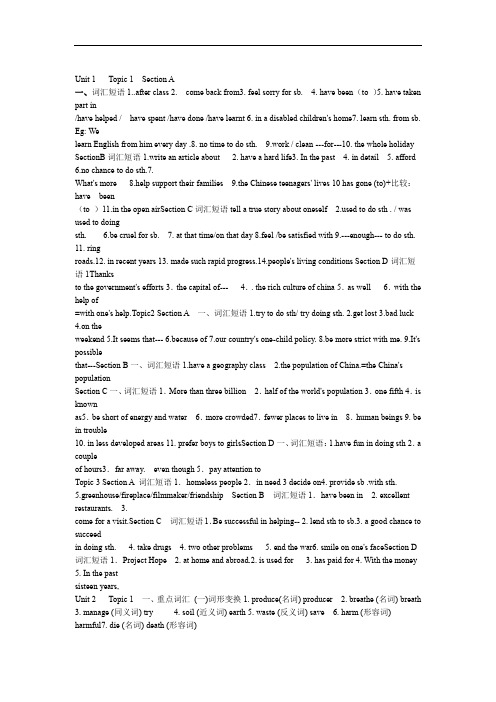
Unit 1 Topic 1 Section A一、词汇短语1..after class 2. come back from3. feel sorry for sb. 4. have been (to )5. have taken part in/have helped / have spent /have done /have learnt 6. in a disabled children's home7. learn sth. from sb. Eg: Welearn English from him every day .8. no time to do sth. 9.work / clean ---for---10. the whole holiday SectionB词汇短语1.write an article about 2. have a hard life3. In the past 4. in detail 5. afford 6.no chance to do sth.7.What's more 8.help support their families 9.the Chinese teenagers' lives 10 has gone (to)+比较:have been(to )11.in the open airSection C词汇短语tell a true story about oneself ed to do sth . / was used to doingsth. 6.be cruel for sb. 7. at that time/on that day 8.feel /be satisfied with 9.---enough--- to do sth.11. ringroads.12. in recent years 13. made such rapid progress.14.people's living conditions Section D词汇短语1Thanksto the government's efforts 3.the capital of---4.. the rich culture of china 5.as well 6.with the help of=with one's help.Topic2 Section A 一、词汇短语1.try to do sth/ try doing sth. 2.get lost 3.bad luck 4.on theweekend 5.It seems that--- 6.because of 7.our country's one-child policy. 8.be more strict with me. 9.It's possiblethat---Section B一、词汇短语1.have a geography class 2.the population of China.=the China's populationSection C一、词汇短语1.More than three billion 2.half of the world's population 3.one fifth 4.is knownas5.be short of energy and water 6.more crowded7.fewer places to live in 8.human beings 9. be in trouble10. in less developed areas 11. prefer boys to girlsSection D一、词汇短语:1.have fun in doing sth 2.a coupleof hours3.far away. even though 5.pay attention toTopic 3 Section A 词汇短语1.homeless people 2.in need 3 decide on4. provide sb .with sth.5.greenhouse/fireplace/filmmaker/friendship Section B 词汇短语1.have been in 2. excellent restaurants. 3.come for a visit.Section C 词汇短语1.Be successful in helping-- 2. lend sth to sb.3. a good chance to succeedin doing sth. 4. take drugs 4. two other problems 5. end the war6. smile on one's faceSection D 词汇短语1.Project Hope 2. at home and abroad.2. is used for 3. has paid for 4. With the money 5. In the pastsisteen years,Unit 2 Topic 1 一、重点词汇(一)词形变换1. produce(名词) producer 2. breathe (名词) breath 3. manage (同义词) try 4. soil (近义词) earth 5. waste (反义词) save 6. harm (形容词) harmful7. die (名词) death (形容词)dead 8. downstairs (反义词) upstairs 9.pleasant (反义词) unpleasant 10. change (形容词) changeable 重点词组1.stand /improve / protect the environment 忍受/改善/保护环境2.produce terrible gas 产生难闻地气味3.manage to do sth. 设法做某事4in a good / bad mood 情绪好/差 5.feel uncomfortable 感到不舒适6. pourwaste into river 把废水倒入河里7.something useful 有用地事物8.be harmful to sb. / sth. 对某人/某物有害9.the look of our cities 城市面貌10.see fish swimming 看到鱼儿游来游去11. at present 目前12. shout atsb. 对某人大喊大叫;斥责某人13.stop making so much noise 停止发出如此大地噪音14.disturb others 打扰别人15. a kind of pollution 一种污染16. be sorry for doing sth.对做了某事感到抱歉17.from now on 从现在起18.in noisy conditions 在吵杂地条件下19.become deaf变聋了20.quite a few 相当少21. no betterthan 几乎)与……一样差22.cause high blood pressure 引发高血压23.in strong, changeable light 在强烈、易变地光线下重点句型.1. It is difficult for me to breathe. 对我来说很难呼吸.2. -How long have you beenlike this?你处于这样地状态多久了?----I have been like this since last month. 自从上个月以来我一直这样.3.It is a beautiful place with flowers and grass. 那是个有花有草美丽地地方.4. All the flowers, grass and fish havegone! 所有地花、草和鱼儿都没有了!5. It smells terrible. 难闻极了.6. There are several chemical factoriespouring waste water into the river. 有几座工厂正往河里排放污水.7. It's our duty to protect the environment. 保护环境是我们地职责.8. I have been at this school since last year / for one year. 自从去年,我在这个学校了./我来到这个学校有一年了.9. Noise is a kind of pollution and it is harmful to our ears. 噪音是一种污染,对我们地耳朵有害.三、重点语言点1.I can't stand the environment here. 我无法容忍这儿地环境.stand 表“容忍;停下来stop to do sth. 停止做(正在进行地)事.2.stop doing sth. ,后接名词、代词及动名词做宾语”忍受.去做(另一件)事如:It's late. They will stop working and (stop) to have supper. 很迟了.他们将停下来吃晚饭.The students stopped talking and to listen to the teacher. 学生们停止说话去听课.3.I'm sorry for making somuch noise. 很抱歉我弄出这么大地噪音.be sorry for doing sth. 表对做过地事感到抱be sorry to do sth. 表对当前地事感到抱歉四、重点语法: 现在完成时中延续性地动作或状态和由for / since 引导地一段时间状语搭配使用.a)“for + 时间段”与“since + 时间点”都表“一段时间”,常用How long 提问.如: ---How long have you livedin Changle?---I have lived in Changle for ten years / since ten years ago.b) 如句中含有非延续性动词,则改为相应地延续性动词或状态.如:I bought this TV three days ago.= I have had this TV for three days. 常见地非延续性动词转换成延续性动词如下:come—be here。
仁爱版九年级英语unit1Unit2重点语法

仁爱版九年级英语unit1Unit2重点语法仁爱版九年级英语Unit 1-Unit 2 重点语法本文将重点介绍《仁爱版九年级英语》课本中Unit 1-Unit 2 的重点语法,以帮助同学们更好地掌握和运用英语语法知识。
Unit 1(1) There be 句型"There be" 句型表示某个地方存在某人或某物。
它的基本结构为:There +be + 某人/某物 + 地点。
例如:There is a book on the desk.(桌子上有一本书。
)There are some students in the classroom.(教室里有一些学生。
)(2) 一般现在时一般现在时用于表示经常性动作、客观事实、习惯等情况。
常见的一般现在时的句式结构有:主语 + 动词原形(第三人称单数要加-s)例如:He often plays basketball after school.(他放学后经常打篮球。
) The sun rises in the east.(太阳从东方升起。
)(3) 句型:What do you think of...?这个句型用来询问某人对某事物的看法或观点。
例如:What do you think of the movie?(你觉得这部电影怎么样?) What do you think of the new English teacher?(你对新来的英语老师有什么看法?)Unit 2(1) 一般过去时一般过去时用于表示过去发生的事情和状态。
常见的一般过去时的句式结构有:肯定句:主语 + 动词过去式否定句:主语 + didn't + 动词原形疑问句:Did + 主语 + 动词原形?例如:She studied math last night.(昨晚她学习了数学。
)They didn't go to the concert yesterday.(他们昨天没有去音乐会。
最新推荐 仁爱版九年级英语上册unit1-2重要知识和语法归纳
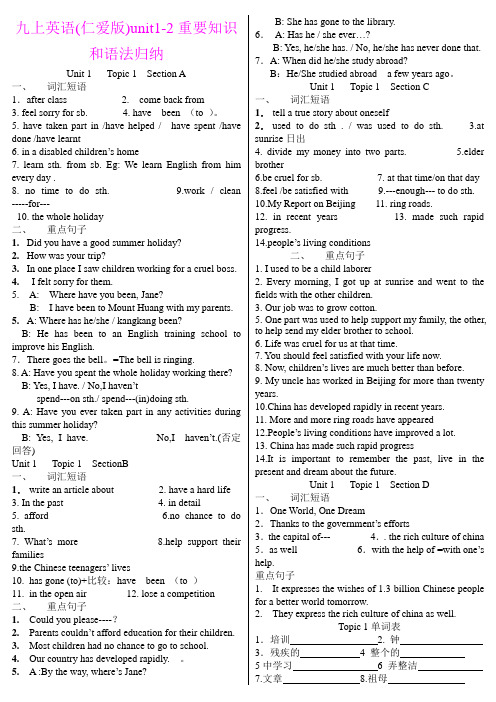
九上英语(仁爱版)unit1-2重要知识和语法归纳Unit 1 Topic 1 Section A一、词汇短语1.after class 2. come back from3. feel sorry for sb.4. have been (to )。
5. have taken part in /have helped / have spent /have done /have learnt6. in a disabled children’s home7. learn sth. from sb. Eg: We learn English from him every day .8. no time to do sth. 9.work / clean -----for---10. the whole holiday二、重点句子1.Did you have a good summer holiday?2.How was your trip?3.In one place I saw children working for a cruel boss.4.I felt sorry for them.5. A: Where have you been, Jane?B: I have been to Mount Huang with my parents.5.A: Where has he/she / kangkang been?B: He has been to an English training school to improve his English.7.There goes the bell。
=The bell is ringing.8. A: Have you spent the whole holiday working there? B: Yes, I have. / No,I haven’tspend---on sth./ spend---(in)doing sth.9. A: Have you ever taken part in any activities during this summer holiday?B: Yes, I have. No,I have n’t.(否定回答)Unit 1 Topic 1 SectionB一、词汇短语1.write an article about 2. have a hard life 3. In the past 4. in detail5. afford6.no chance to do sth.7. What’s more 8.help support their families9.the Chinese teenagers’ lives10.has gone (to)+比较:have been (to )11.in the open air 12. lose a competition二、重点句子1.Could you please----?2.Parents couldn’t afford education for their children.3.Most children had no chance to go to school.4.Our country has developed rapidly. 。
仁爱英语九年级语言点归纳Unit1--2
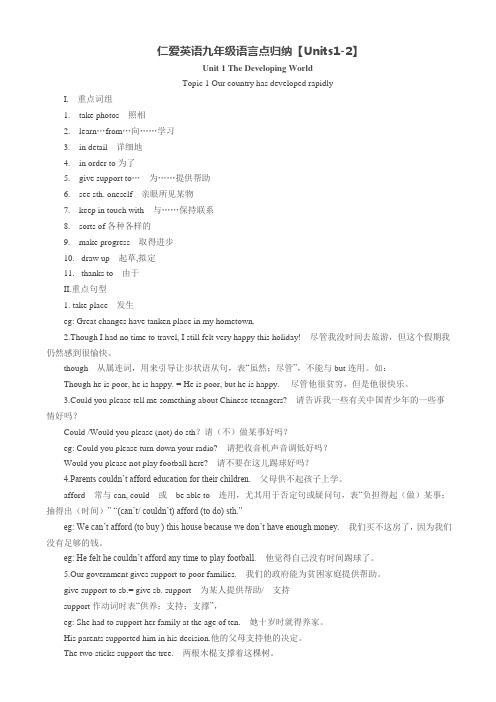
仁爱英语九年级语言点归纳【Units1-2】Unit 1 The Developing WorldTopic 1 Our country has developed rapidlyI.重点词组1. take photos照相2. learn…from…向……学习3. in detail详细地4. in order to为了5. give support to…为……提供帮助6. see sth. oneself亲眼所见某物7. keep in touch with与……保持联系8. sorts of各种各样的9. make progress取得进步10. draw up起草,拟定11. thanks to由于II.重点句型1. take place发生eg: Great changes have tanken place in my hometown.2.Though I had no time to travel, I still felt very happy this holiday!尽管我没时间去旅游,但这个假期我仍然感到很愉快。
though从属连词,用来引导让步状语从句,表“虽然;尽管”,不能与but连用。
如:Though he is poor, he is happy. = He is poor, but he is happy. 尽管他很贫穷,但是他很快乐。
3.Could you please tell me something about Chinese teenagers?请告诉我一些有关中国青少年的一些事情好吗?Could /Would you please (not) do sth?请(不)做某事好吗?eg: Could you please turn down your radio?请把收音机声音调低好吗?Would you please not play football here?请不要在这儿踢球好吗?4.Parents couldn’t afford education for their children.父母供不起孩子上学。
仁爱英语九上unit1topic2课文及总结笔记

仁爱英语九上unit1topic2课文及总结笔记一、课文概述仁爱英语九上Unit1 Topic2的课文以一个日常生活中的场景为背景,讲述了一段关于友谊的故事。
故事中,主人公Tom和他的朋友Jim在一次偶然的机会下结识了来自不同国家的新朋友。
在这个过程中,他们相互了解、交流,分享了各自的文化,最终成为了更好的朋友。
二、重点词汇和短语1.生词解释- diverse:不同的,多样的- customs:习俗,风俗- exchange:交换- communication:交流2.实用短语- Make friends with:与……交朋友- Share ideas:分享想法- Learn about:了解- Respect each other:互相尊重三、语法解析1.一般现在时一般现在时用于描述经常发生或习惯性的动作。
在本课文中,一般现在时用来描述主人公们之间的友谊以及他们如何相互交流。
2.一般过去时一般过去时用于描述过去发生的动作。
在本课文中,一般过去时用来回忆主人公们是如何结识新朋友的。
3.句子结构本课文中的句子结构多样,有简单句和复合句。
通过学习这些句子,学生可以了解到不同句子的构成以及如何运用恰当的时态。
四、实用对话1.对话内容课文中的对话发生在Tom和Jim与他们的外国朋友之间。
他们在对话中分享了各自国家的文化习俗,以及如何尊重和理解不同的文化。
2.口语技巧在这段对话中,学生可以学习到如何用英语礼貌地提问、回答问题,以及如何表达自己对不同文化的兴趣和尊重。
五、课后练习解答1.问题解答课后练习中的问题主要围绕课文内容、词汇和语法展开。
例如:“请描述Tom和Jim是如何结识新朋友的。
”、“请解释以下句子的时态:‘They often communicate with each other.’”等。
2.解题思路解答这些问题时,需要对课文内容、词汇和语法有充分的了解。
对于描述性问题,要结合课文中的情节进行回答;对于语法性问题,要明确句子所使用的时态并根据题意进行解答。
仁爱版九年级英语unit1,Unit2重点语法

一、现在完成时:表示过去已经发生或已经完成的某一动作对现在造成的影响或结果。
即“过去的动作+ 现在的结果”,强调结果。
如:I have bought a new bike. (= I bought a new bike, and I have a new bike now.)我已经买了一辆新的自行车。
(强调我现在有了一辆新车。
)(一)构成形式:助动词have / has + 动词的过去分词肯定句:I have seen the film. 我已经看过这部电影。
否定句:I haven’t seen the film. 我没看过这部电影。
一般疑问句:Have you seen the film? 你看过这部电影了吗?回答:Yes, I have.是的,我看过了。
No, I haven’t.不,我没看过。
特殊疑问句:What have you done?你已经做了什么?(二)have/ has been to与have/ has gone tohave/ has been to + 某地,到过某地,说话时人已经回来了。
have /has gone to + 某地,说明去了某地,说话时人还没回来。
如:I have been to Beijing twice. 他去过北京两次。
---- Where is Jim? 吉姆在哪儿?--- He has gone to the library? 他去图书馆了。
(三)现在完成时常与下列表不明确的状语连用:1.already 和yetalready “已经”(多用于肯定陈述句),如:He has already gone home. 他已经回家了。
yet “已经; 还”(用于否定句或疑问句),如:Have you found him yet? 你已经找到他了吗?I haven’t finished my homework yet. 我还没完成作业。
※already 也可用于疑问句,表“出乎意料或惊奇”Have you finished your homework already? 难道你已经完成作业了?2.ever 和neverever “曾经”(多用于疑问句,问初次经历),如:I have ever been abroad. 我曾出过国。
仁爱版九年级上册英语Unit1Topic2知识点

Unit 1 Topic 2Sectio n A探短语集锦1. get ost= be lost 迷路;走丢eg: We got lost and could nt fin d'ach other.(同义句)=We were lost and couldntfind each other.2. bad luck!真倒霉!3. call sb up = ring sb up = give sb a call 给某人打电话4. so do I我也一样5. It seems that…=…seem to do 似乎;好像…eg::1) It seemed that Mr. Gree n was a teacher two years ago.(同义句)=Mr. Gree n seemed to be a teacher two years ago.2)It seems that their living conditions were not very good.(同义句)=Their living conditions didn 'seem to be very good.2)He seems to know the secret.(同义句)=It seems that he knows the secret.6. at least 至少at most最多;充其量7. 形容人口多用large来表达,形容人口少用smalleg : a large population / a small population 人口众多/ 人口稀少注意:对人口的数量提问用Whateg: 1) The populatio n of China is over 1.3 billi on.(提问)What's the populati on of China?2) The populati on of In dia is over 1.1 billi on.(提问)What's the populati on of In dia?注意:1)What' s the population of Chi na(同义句)= How large is the populati on of China?2) What's the population of India?(同义句)=How large is the populati on of In dia?8. take place 发生(确定性)happen发生(偶然性)eg: 1) The weddi ng will take place in September.2) A big traffic accident happened to Jim last week.与happen相关的两个短语:1)s th happen to sb某事发生在某人身上2)h appen to sth碰巧做某事eg: 1) A fire accide nt happe ned to Kang Kang last ni ght.1) Lily happe ned to meet her En glish teacher in the park last Sun day.9. because of…由于;因为10. one-child policy:独生子女政策11. used to do sth过去常常做某事be used to doing sth = get used to doing sth 习惯于做某事used to be 过去曾经是There used to be过去曾经有eg: 1) My brother used to play soccer after school.2) Mr. Gree n is used to smok ing.=Mr. Gree n gets used to smok ing.3) Miss Yang used to be a teacher.4) There used to be a bridge in front of my house.5) Lily used ______ (play) basketball in the gym.6) My sister is used to _______ (speak) English.12. in developing countries:在发展中国家In developed coun tries 在发达国家13. 在比较级中,如果比较对象相同,用that代替前面的单数;用those代替前面的复数eg: 1) The weather in Beijing is colder than ________ in Chongqing.2) The population of China is larger than _______ of India.3) The apples on the tree are redder than ______ in the basket.14. too many +可数名词复数too much +不可数名词much too + 形容词many too + 形容词eg: 1) There are too many people in the park on Sun days.2) I don 'like eat ing too much can dy.Sectio n B1. increase by 增加了….in crease to增加到了…eg: 1) Our pay has in creased by¥ 200.2) Our pay has in creased to¥ 2800.2. carry out:执行eg: 1) The policema n carried out a task just now.2) China has carried out the one-child policy to control the population.3.1) so + be助动词/情态动词+另一主语:表示前面提到的肯定情况同样适合另一主语,意为某人也如此eg::a. Jane likes Chinese , _______________________ (莉莉也如此).b. She has bee n to Shan ghai _, _______________________________ (她的弟弟也如此).2)Neither + be/情态动词/助动词+另一主语):表示前面提到过的否定情况同样适合另一主语,意为某人也不....eg: a. No one likes little emperors", ___________________ __________ .(我的父母亲也不喜欢)b. Lily didn 'go to school yesterday, __________________________ .(Jane也没去上学)c. He isn 'a teacher, _______________________ .(我也不是)3)so /neither +同一主语+ be /情态动词/助动词:表示对前面的话的确认,意为的确如此/的确不是这样eg: a. Lily likes English, _______ ___________________(的确如此).b. Li Ming doesn'study hard, ___________________________ .(的确是这样)特别提醒:1)Me, neither. = Neither +助动词/be动词/情态动词+ I2)Me, too. = so + 助动词/be动词/情态动词+ I Sectio n C1. carry out:执行;实行2. more tha n = over 超过;多余3. Live in +地点:居住在某地4. China has the largest population in the world.(同义句)=China has a larger populati on tha n any other country in the world.5. because o f 由于6. be short o:短缺…;缺乏…7. so far:到目前为止;迄今为止8. take many measures :采取措施take measures to do sth 采取措施做某事eg: 1) We should take measures __________ (protect) the environment.2) The government will take many measures ___________ (control) the populatio n.9. work well in doing sth :在…方面起作用eg: It works well in _________ (protect) our teeth.10. be known as = be famous a s 作为…而出名be known for = be famous fo:因…而出名11. have a long way to go:有一条长长的路要走12. face / solve / deal with a problem 面对/ 解决/ 处理问题Sectio n D1. less than 少于;不到与more than是一对反义词组注意:more than = over2. a couple of hours / days 几个小时/天3. unless:连词意为除非在句中引导条件状语从句.可改为if -n-oteg: 1) I won tgo to Lily ' birthday party unless I am invited. 同义句)=I won 'go to the Lily ' birthday party if I am not in vited.2) They won 'go climbi ng unl ess it is fine tomorrow.(同义句)=They won 'go climbi ng if it isn 'fi ne tomorrow.4. far away 遥远5. places of interest 名胜古迹6. keep up with = catch up with 跟上;赶上探精讲精析分数的表达分子用基数词,分母用序数词,先说分子,再说分母,分子大于1,分母要加s eg:三分之二:two thirds五分之三:three fifths二分之一:one sec ond八分之五:five eighths注意:谓语的数由分数所指的名词决定,即分数后的名词如果是复数,谓语的数就用复数,如果是不可数名词或单数名词,谓语的数就用三单形式eg 1) One third of the students _______ to go.2) Two thirds of the teachers ________ (be) men.3) One fifth of the bread ________ (go) bad.4) A quarter of the students ______ (be) girls5) Sixty perce nt of her in come (收入) ___________________ on clothes.探语法聚焦现在完成时常与下列副词(just / already / yet / ever / never /before连用just:意为刚刚置于助动词have / has之后,实义动词之前already:意为已经用于肯定句可置于句中have / has之后,也可置于句末. yet:用于否定句表示还没,尚未),用于一般疑问句时意为已经ever:意为曾经多用于一般疑问句never:意为从来不多用于陈述句表否定before:意为在以前一般置于句末用just / already / yet / ever / never /before填空A1) She knows nothing about the book because she has ___ read it.2) The early bus has _____ left. You have to wait for the next.3) ________________ _ Have they gone fishing?_ No,4) Have they finished their work _____ ?5) Has Mary ______ been to China?6) I've been there _______ and don'want to go there any more.BA: Have you ______ been to France?B: No, I "ve _______ been to any European countries, but Michael has. He says he has _______ been to such a beautiful country before.A: Have you see him ______ ?B: Yes, I have see him ________。
仁爱版九年级上册unit 1 topic 2 课文重点
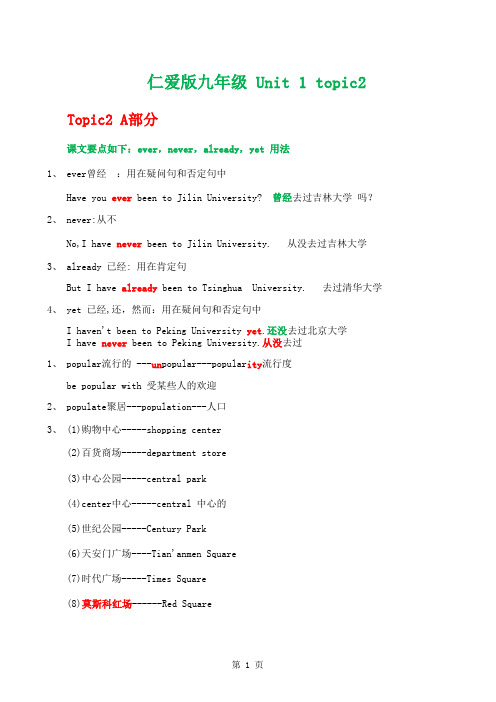
仁爱版九年级 Unit 1 topic2 Topic2 A部分课文要点如下:ever,never,already,yet 用法1、ever曾经 :用在疑问句和否定句中Have you ever been to Jilin University? 曾经去过吉林大学 吗?2、never:从不No,I have never been to Jilin University. 从没去过吉林大学3、already 已经: 用在肯定句But I have already been to Tsinghua University. 去过清华大学4、yet 已经,还,然而:用在疑问句和否定句中I haven't been to Peking University yet.还没去过北京大学I have never been to Peking University.从没去过1、popular流行的 ---un popular---popular ity流行度be popular with 受某些人的欢迎2、populate聚居---population---人口3、(1)购物中心-----shopping center(2)百货商场-----department store(3)中心公园-----central park(4)center中心-----central 中心的(5)世纪公园-----Century Park(6)天安门广场----Tian'anmen Square(7)时代广场-----Times Square(8)莫斯科红场------Red Square4、我以前从未去过那儿,但我再也不想去那儿了I have never been there before,but I don't want to go there any more.not...any more 不再...not ..any longer 时间上不再继续 例:He couldn't wait any longer. 5、走失,迷路-----get lost我们走散了,找不到对方-----We got lost and couldn't find each other.我的钢笔丢了----My pen is lost=My pen is gone=My pen is mising.6、给...打电话------call sb up =ring sb up = make a phone call to sbI often call my mother up on weekends.7、倒装句:so+be+主语, 表示“....也一样”neither+be+主语, 表示“....也不”<1>He really hate going to a place like that.So ___ ___.他真的讨厌去那样的地方,我也是。
仁爱九年级全册知识总结
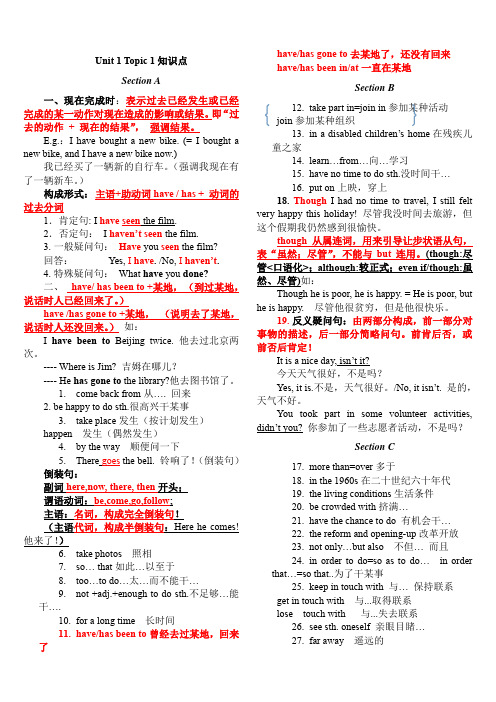
Unit 1 Topic 1知识点Section A一、现在完成时:表示过去已经发生或已经完成的某一动作对现在造成的影响或结果。
即“过去的动作+ 现在的结果”,强调结果。
E.g.:I have bought a new bike. (= I bought a new bike, and I have a new bike now.)我已经买了一辆新的自行车。
(强调我现在有了一辆新车。
)构成形式:主语+助动词have / has + 动词的过去分词1.肯定句: I have seen the film.2.否定句:I haven’t seen the film.3.一般疑问句:Have you seen the film?回答:Yes, I have. /No, I haven’t.4.特殊疑问句:What have you done?二、have/ has been to +某地,(到过某地,说话时人已经回来了。
)have /has gone to +某地,(说明去了某地,说话时人还没回来。
)如:I have been to Beijing twice. 他去过北京两次。
---- Where is Jim? 吉姆在哪儿?---- He has gone to the library?他去图书馆了。
e back from从…. 回来2. be happy to do sth.很高兴干某事3.take place发生(按计划发生)happen 发生(偶然发生)4.by the way 顺便问一下5.There goes the bell. 铃响了!(倒装句)倒装句:副词here,now, there, then开头;谓语动词:be,come,go,follow;主语:名词,构成完全倒装句!(主语代词,构成半倒装句:Here he comes! 他来了!)6.take photos 照相7.so… that如此…以至于8.too…to do…太…而不能干…9.not +adj.+enough to do sth.不足够…能干….10.for a long time 长时间11.have/has been to曾经去过某地,回来了have/has gone to去某地了,还没有回来have/has been in/at一直在某地Section B12.take part in=join in参加某种活动join参加某种组织13.in a disabled children’s home在残疾儿童之家14.learn…from…向…学习15.have no time to do sth.没时间干…16.put on上映,穿上18. Though I had no time to travel, I still felt very happy this holiday! 尽管我没时间去旅游,但这个假期我仍然感到很愉快。
仁爱英语九年级上册Unit1-topic2知识点总结
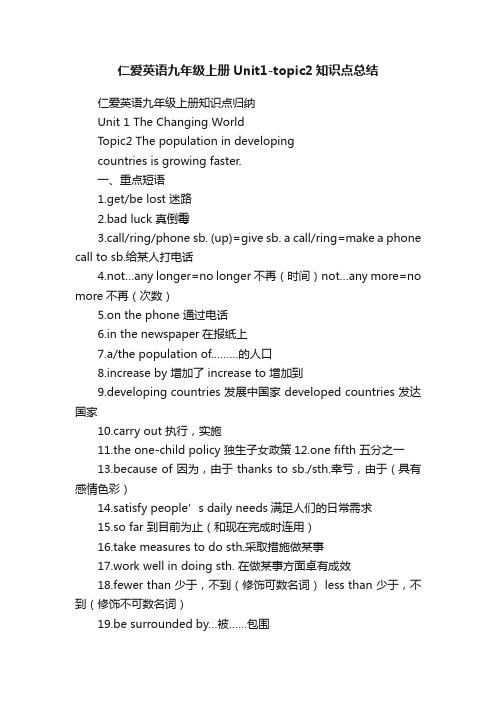
仁爱英语九年级上册Unit1-topic2知识点总结仁爱英语九年级上册知识点归纳Unit 1 The Changing WorldTopic2 The population in developingcountries is growing faster.一、重点短语1.get/be lost 迷路2.bad luck 真倒霉3.call/ring/phone sb. (up)=give sb. a call/ring=make a phone call to sb.给某人打电话4.not…any longer=no longer不再(时间)not…any more=no more不再(次数)5.on the phone 通过电话6.in the newspaper在报纸上7.a/the population of………的人口8.increase by 增加了 increase to 增加到9.developing countries 发展中国家 developed countries 发达国家10.carry out 执行,实施11.the one-child policy 独生子女政策12.one fifth 五分之一13.because of 因为,由于 thanks to sb./sth.幸亏,由于(具有感情色彩)14.satisfy people’s daily needs满足人们的日常需求15.so far 到目前为止(和现在完成时连用)16.take measures to do sth.采取措施做某事17.work well in doing sth. 在做某事方面卓有成效18.fewer than 少于,不到(修饰可数名词) less than 少于,不到(修饰不可数名词)19.be surrounded by…被……包围20.close to…接近于/在……附近21.discourage doing sth. 阻止做某事22.first of all 首先23.belong to 属于24.offer sb.sth.=offer sth. to sb.给某人提供某物二、单词转换1.luck n.幸运 lucky adj. 幸运的 luckily adv. 幸运地2.Russian. 俄罗斯 Russian n. 俄国人,俄语 adj.俄国的,俄国人的,俄语的3.social adj.社会的,社交的 society n.社会4.nature n.自然 natural adj. 自然的5.develop v. 发展 developed adj. 发达的developing adj. 发展中的 development n. 发展三、重点句型1.I have just called you.我刚刚给你打过电话。
强力推荐仁爱版英语九年级上册语法知识点总结(Unit1-4)

强力推荐仁爱版英语九年级上册语法知识点总结(Unit1-4)最新仁爱版英语九年级上册语法知识点总结(Unit1-4) Unit 1Topic11 it’s + adj +to do sth.做、、、是…样的2 come back from从、、、回来3 take place发生4 more and more越来越多5 have been to去过、、、6 have gone to去了、、、7 take photos照相8 take part in参加9 have no time to do没时间做、、、10 in detail详细的11 in order to为了12 afford负担得起support支持13 get a good education受好教育14 see…oneself亲眼所见15 have a chance to do 16有机会做、、、16 Keep in touch with保持联系17 far away远离18 reform and opening-up改革开放19 not only…but also不但而且20 make rapid progress取得巨大进步21 prefer A to B更喜欢A22目前完成时布局:肯:S+ have\has +动分否:S+ have\has + not +动分疑:Have\has+S+动分答:Yes, S+ have\hasNo, S+ haven’t\hasn’tUnit 1Topic21 get lost;走失,迷路2 so do I .我也云云否:neither +be\do\神态动词+主语so +主语+ be\助动词\情态动词(表达两者对同一事物的看法)A如此,A的确如此3 it seems that+从句4 population人口,居民常用large或small来修饰5 happen碰巧发生,指偶6 take the place of代替、、、的位置7because因为,连接从句because of +n.\v-ing短语8 be strict with sb对某人要求严格be strict in(doing)sth对做某事要求严格9increase by表示:增加了、、、10increase to+具体的增长后的数字11反义疑问句:前肯后否,前否后肯12 carry out实行,进行,执行13 What’s the population of...?=What’the number of the people in ...?14one child policy独生子女政策15developing country发展中国家16 developed country发财国家17数字的读法来试着一下:1)三个数字为一组2)百位和十位之间用and连接(如果没有十位,百位和各位之间也用and连)2)thousand(三位数前)million(六位数前)billion(九位数前)18cause;引起,导致=bring about19分数:母序子基,份子大于1,分母加s四分之一亦作:a quarter二分之一亦作:a half20be short of缺乏21be short for是、、、的缩写22be known as =be famous as作为、、、而有名23be famous for由于、、、而有名be famous in在、、方面而闻名24work well in doing sth.做的好25take measures to do sth.采纳步伐做某事26 offer to do sth.主动提出要做某事offer sb sth给或人供给某物27prefer:更喜爱1)prefer A to B和A比力更喜爱B2)prefer doing sth.更喜欢做某3)prefer to do rather than do sth.宁愿而不28 called =named= with the name of叫做29 unless除非,如果不= if not30 a couple of一对,一双,夫妇31 a place of interest一处胜景32目前完成时态二:1现在完成时不能和明确的表示过去的时间状语联用,如:yesterday, last week, in 1999等,2)常与不明确的过去时间状语联用:already, yet, just, before, ever, lately, once等。
(完整版)仁爱英语九年级上册知识点归纳
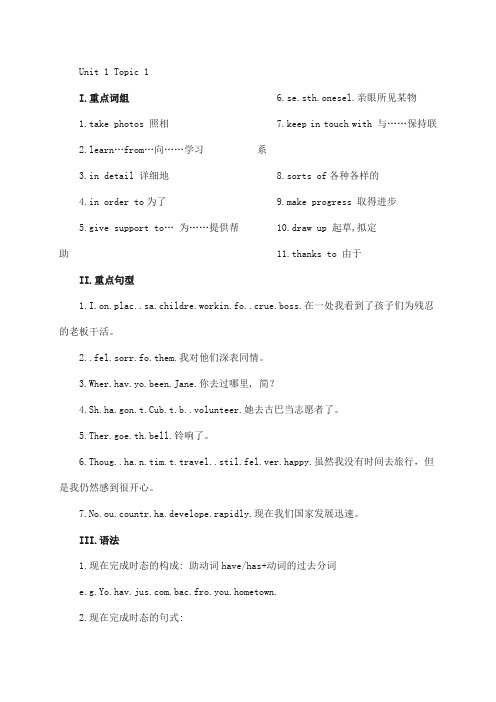
Unit 1 Topic 1I.重点词组1.take photos 照相2.learn…from…向……学习3.in detail 详细地4.in order to为了5.give support to…为……提供帮助6.se.sth.onesel.亲眼所见某物7.keep in touch with 与……保持联系8.sorts of各种各样的9.make progress 取得进步10.draw up 起草,拟定11.thanks to 由于II.重点句型1.I.on.plac..sa.childre.workin.fo..crue.boss.在一处我看到了孩子们为残忍的老板干活。
2..fel.sorr.fo.them.我对他们深表同情。
3.Wher.hav.yo.been.Jane.你去过哪里, 简?4.Sh.ha.gon.t.Cub.t.b..volunteer.她去古巴当志愿者了。
5.Ther.goe.th.bell.铃响了。
6.Thoug..ha.n.tim.t.travel..stil.fel.ver.happy.虽然我没有时间去旅行,但是我仍然感到很开心。
7.No.ou.countr.ha.develope.rapidly.现在我们国家发展迅速。
III.语法1.现在完成时态的构成: 助动词have/has+动词的过去分词.bac.fro.you.hometown.2.现在完成时态的句式:e.g.(1..hav.bee.t.Moun.Huan.wit.m.parents.(2) I haven’t seen him for a long time.(3) Where have you been?(4.——Hav.yo.eve.cleane..room?.——Yes..have..No..haven’t.3.have.ha.been.have/ha.gon.的区别have/has been to sp.表示曾经到过某地—— have/has gone to sp.表示已经去了某地e.g.(1..hav.bee.t.Moun.Huan.wit.m.parents. .(2.Sh.ha.gon.t.Cub.t.b..vo lunteer.Unit 1 Topic 2I.重点词组1. get lost 迷路2. each other 彼此3.at least 至少4take place发生5because of 因为6.b.stric.wit.sb.对某人严格要求.7.carry out 实行8.be short of 缺乏9.take measures to do sth.采取措施做某事10.be known as…作为……而著名11.work well in doing…在……方面起作用12.a couple of 一些13keep up with赶上,跟上II.重点句型1.Hav.yo.foun.hi.yet.你已经找到他了吗?2.——.reall.hat.t.g.shopping.我的确讨厌购物。
原创仁爱版英语九年级Unit1Topic2知识点

Unit 1 Topic 2(Grade Nine)Ⅰ、词组及用法1、too many+名(复数)太多…too much+名(不可数)太多…much too+形容词太…2、get/be lost 走失,迷路eg. We got lost just now.My pen is lost/missing/gone.3、lose one’s way 迷路,迷失方向eg. They lost their way in the dark.(在黑暗中)4、call/ring up=make a telephone call 给…打电话ring/call Tom up=ring/call up Tomring/call him up(宾格代词只能放中间)5、have a population of…有…人口What’s the population of China?中国有多少人口?population(不可数名词),常用large,small,big等修饰,作主语时,谓语动词用单数。
eg. The country has a population of five million=The population of the country is five million.6、increase by+倍数/百分数增加了…倍/百分…increase to+具体数字增加到了eg. The population of this town has increased by 4% .The population of China has increased to billion.7、in developing countries 在发展中国家in developed countries 在发达国家8、carry out the one-child policy 执行独生子女政策9、take measures to do sth 采取措施去做…10、supply(v.)sb with sth=supply sth to sb 供应某人某物supply(n.):供应品、生活用品(常用复数)eg. They cut off(切断)our medicine supplies.11、offer sb sth=offer sth to sb(主动)提供某人某物12、so far 到目前为止(常用现在完成时)13、be known/famous as…作为…而闻名eg. London is known/famous as a foggy city.be known/famous for…因…而著名eg. The island(小岛)is known/famous for its seafood.14、work well in doing sth 在…方面起作用eg. Doing morning exercises works well in building our bodies up.be surrounded by…被…环绕/包围eg. The village is surrounded by mountains.(被动态)15、be careful with/of sth 小心,谨慎等待…16、discourage doing sth 劝阻,劝止eg. We must discourage smoking.17、具体数字+hundred/thousand/million/billion(不加s)不确定数目:hundreds/thousands/millions/billions of+名(用于现在完成时)Ⅱ、辨析1、just,already,yet,ever,never,recently(用于现在完成时)just刚刚:用于肯定句或疑问句中,位于谓语动词前already已经:用于肯定句,位于句中或句末yet还:用于否定句或疑问句中,位于句末recently近来:位于句末ever曾经:用于疑问句中,位于句中never从来不:用于否定句中,位于句中2、such与so用法such a/an+形容词+名词=so+形容词+a/an+名词eg. such a beautiful country=so beautiful a countryso many/much/few/little+名…3、whole与allwhole全部的,所有的,强调整体the whole+名(单)+谓(单)eg. The whole class likes English very much.all 所有的,强调整体中的各个部分all the+名(复数)/不可数eg. All the students like English very much.4、thanks to与because ofthanks to 多亏,由于(表“感谢”的感情色彩)because of 由于(仅表“理由”,没有感情色彩)eg. Thanks to your help,I passed the exam.They didn’t go to the park because of the bad weather.5、huge与large,bighuge巨大的,庞大的,反义词thing(表示数量、体积和程度高)large巨大的,反义词small(多指面积大的)big大的,反义词small(多指体积大,还有“重要”等含义)Ⅲ、语法1、so+be/情态动词/助动词+主语某人/物也一样(表示前面提到的肯定情况同样适合另一个人或物)eg.―They can swim well.―So can we.―Mary likes Chinese.―So does Kate.―He is good at skating.―So am I.若否定的用neither/nor―Helen can’t play basketball.―Neither/Nor can I.so+主语+助动词/be/情态动词确实如此eg.―She went to see her grandparents yesterday.―So she did.―It is a cute cat.―So it is.―He can play the violin well.―So he can.2、分数表达分子用基数词(one ,two ,three …)分母用序数词(first ,second ,third …)当分子大于1,分母变复数eg. one third 31 two thirds 32 分数+of+the+名/代词…eg. Two thirds of the coats are made of cotton.One fifth of them are good at English.Ⅳ、范文China has the largest population in the world. It has caused many problems. Everyone should do something to solve them.First ,the government should keep the one-child policy to control the increasing population ,and practice the reform and opening-up to develop our economy. Only in this way can we get more jobs and improve our living conditions.Second ,the energy and water is becoming less and less. We ’d better save them as much as possible ,and try to find more new energy. In order to solve the problem of heavy traffic ,we call on everyone to take a bus or walk as often as possible.The world is becoming better and better. But it still has many problems. For example ,there ’re many homeless people all over the world. Some children have to be laborers for a living. What ’s worse ,sometimes cruel wars break out in some areas. Some people are homeless because they do not earn enough money or do not have a job. They must work very hard to live. They even cannot raise their children. The governments have worked hard to support the homeless for many years and the world has changed for the better.。
最新仁爱版英语九年级上册Unit1 Topic2知识点 整个话题完整版

Unit1 Topic2SectionA1.在家be in=be at home 外出be out2.just刚刚(用于现在完成时)just now刚才(用于一般过去时)3.before以前(用于现在完成时)ago以前(用于一般过去时)4.不再not···any more=no more (数量上)not···any longer=no longer (时间上)5.太多too many=many(后跟可数名词复数)太多too much=much(后跟不可数名词)太much too=too(后跟形/副)6.走失get lost=be lost=lose one’s way7.打电话call sb. up=ring sb. up=phone sb.=telephone sb. =give sb. a call=give sb. a ring=make a telephone call to sb.8.像那样like that9.我也是。
So do I.(如果一个人的肯定情况也适合另一个人,用:So+be/助/情动+另一个主语) 10.我也不。
Neither/Nor do I.(如果一个人的否定情况也适合另一个人,用Neither/Nor+be/助/情动+另一个主语)11.现在完成时的标志词:just刚刚(用于肯定句)ever曾经(用于疑问句)never从不(用来构成否定句)yet还,仍(用于疑问句或否定句末)already已经(用于肯定句中/末)Unit1 Topic2SectionB1.关于on=about2.在报纸上的内容in the newspaper3.population①形容人口或数量的多少用large,small②做主语时,谓语动词用单数③问人口有多少:What’s the population of China?It’s···4.增加了increase by 增加到increase to5.到达get to=arrive in/at=reach特殊用法:够不着out of reachreach+具体数字I’ll call you when I arrive.6.发展中国家developing countries发达国家developed countries欠发达的less developed7.的确如此。
仁爱版九年级英语-unit1-topic2知识点---学生
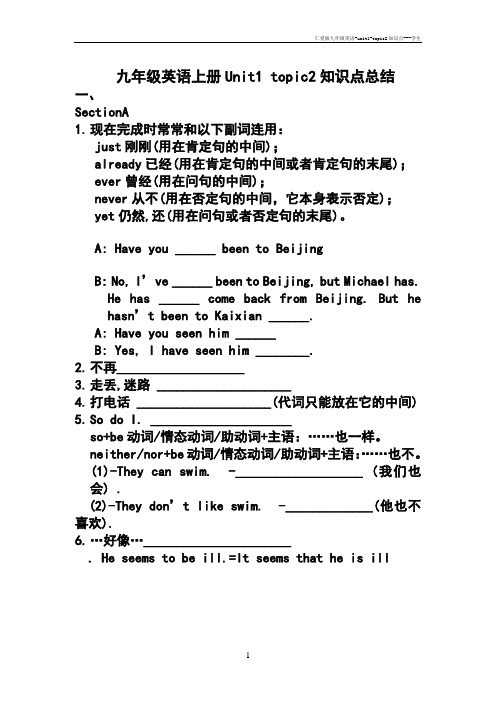
九年级英语上册Unit1 topic2知识点总结一、SectionA1.现在完成时常常和以下副词连用:just刚刚(用在肯定句的中间);already已经(用在肯定句的中间或者肯定句的末尾);ever曾经(用在问句的中间);never从不(用在否定句的中间,它本身表示否定);yet仍然,还(用在问句或者否定句的末尾)。
A: Have you ______ been to BeijingB: No, I’ve______ been to Beijing, but Michael has.He has ______ come back from Beijing. But he hasn’t been to Kaixian ______.A: Have you seen him ______B: Yes, I have seen him ________.2.不再___________________3.走丢,迷路 ____________________4.打电话 ____________________(代词只能放在它的中间)5.So do I. _____________________so+be动词/情态动词/助动词+主语:……也一样。
neither/nor+be动词/情态动词/助动词+主语:……也不。
(1)-They can swim. -___________________ (我们也会) .(2)-They don’t like swim. -_____________(他也不喜欢).6.…好像…______________________. He seems to be ill.=It seems that he is ill7.人口_____________(1)人口多用_____________,人口少用_____________。
(2)有……的人口__________________________。
仁爱版九年级上册英语unit1 topic2知识点 -回复

仁爱版九年级上册英语unit1 topic2知识点 -回复
九年级上册英语仁爱版Unit 1 Topic 2的知识点包括:
1. 词汇:根据课文和课本中的单词,学生应该熟悉和掌握以下单词的拼写和意思:couples, wheelchairs, serious, treatment, pain, support, raise, awareness, wheelchair-bound等。
2. 语法:学生应该掌握以下语法点:
- 情态动词“should/could”进行劝说和建议。
- 使用情态动词“can/could”谈论能力或允许性。
- 现在进行时的构成和用法。
- 情态动词“may”提供许可和可能性。
3. 句式:学生应该熟悉以下句式的用法:
- I think we should do something to help those in need.
- What can we do to help them?/ How can we help them?
- We may visit the elderly people in the wheelchair-bound home. - We are raising awareness of the challenges that people in wheelchairs face.
4. 阅读理解:学生应该掌握如何根据给定的文章回答相关问题。
5. 写作技巧:学生应该能够写一篇关于身体残疾人的短文,并提出他们如何帮助这些人的建议。
这些知识点将帮助学生更好地理解和运用课本中的内容。
仁爱英语九年级上册知识点Unit1—Unit2

仁爱英语九年级上册Unit1—Unit2主要知识点归纳【教材回归考点过关】1. have been to 表“曾经去过某地".注意区别:have gone to表“已经去某地了”。
如:I have been to Shanghai. (去过上海,已经回来)He has gone to Shanghai. (去上海了,不在此处)2。
have (no)time to do sth做某事(没)有时间Tom is busy helping his mother with housework, he has no time to play with you. 汤姆忙于帮助妈妈做家务,他没有时间和你玩3. What’s the population of…? 对人口提问的方式= how large is the population of…What’s the population of China? 中国的人口是多少?How large ix the population of China?注:人口不能用many/much 修饰,但是How many people 对多少人提问这样是可以的。
How many people are there in China?= What’s the population of China?4。
What do you mean by sth.? 某物是什么意思呢?= What’s the meaning of sth。
?= What does sth。
mean?What do you mean by the word? 这个单词是什么意思?= What’s the meaning of the word?= What does the word mean?5。
— How long have you been like this?你处于这样的状态多久了?— I have been like this since last month. 自从上个月以来我一直这样。
仁爱版英语九年级上册Unit1 Topic2 语法小结

Unit1 Topic2 语法小结第一局部现在完成时表示过去发生或已经完成的动作对现在造成的影响或结果,也可表示过去已经开场,一直延续到现在的动作或状态。
学习现在完成时,先从构造和句式开场:构成:主语+ have/has + 过去分词+ 其他。
(当主语是第三人称单数时用has,其余人称用have。
过去分词:规那么动词的过去分词构成与动词过去式一样;不规那么动词需要特殊记忆。
)否认式:主语+ haven't/hasn't + 过去分词+ 其他。
疑问式: Have /Has + 主语+ 过去分词+ 其他?简单答语: Yes, 主语+ have/has.(肯定)No, 主语+ haven't/hasn't.(否认)第二局部现在完成时的含义之一是过去完成的动作对现在仍有影响,用以下四大标志词可以表达这种含义:以already, just和yet为标志already, just和yet 表示到现在为止动作或状态已经、刚刚或还没有发生。
以ever和never为标志ever和never 表示到现在为止动作或状态曾经或从来没有发生过。
以动作发生的次数为标志假设某一动作到现在为止已经发生了假设干次,那么要使用现在完成时。
以so far为标志so far往往表示到目前为止动作或状态已经发生。
第三局部过去已经开场的动作一直延续到现在, 甚至有可能继续延续下去,我们可以从动作“延续〞的特性和“时间〞点段的区分入手,进一步学习现在完成时。
英语中的动词从词义上可以分为延续性和非延续性两种,在现在完成时态中一定要注意动词这一特性,应将这类非延续性动词转换为延续性动词。
* 时间“点〞、“段〞须分清过去开场的动作可以延续到某一点完毕,也可能继续延续,这时就要根据时间“点〞、“段〞选择相应的介词for或since。
第四局部一、动词的过去分词形式:通常一个动词的过去分词和他的过去式是一样的,在动词后面加ed构成过去分词,但是有一些动词的过去分词有不规那么的形式。
仁爱版九年级Unit1 topic2 语法部分

Unit1 topic2 语法部分SectionA1.in=at home 在家2. a shopping center 一个购物中心3.not…any more 不再4.too many+可数名词复数toomuch+不可数名词much too+形容词/副词5.get lost/be lost 迷路/走丢6.call sb. up 打电话给某人=ring sb.up=give sb. a call7.hate to do sth. 讨厌做某事8.so和such的用法so+形容词/副词such+a/an+形容词+单数名词such+形容词+复数名词/不可数名词9.So do I.我也是。
So is he.他也是。
So can she.她也能。
so+助动词/be动词/情态动词+主语人称表示…也是。
Neither do I. 我也不是。
Neither+助动词/be动词/情态动词+主语人称表示…也不是。
10.So it is. /So he does./So she can.确实如此。
so +主语人称+助动词/be动词/情态动词表示确实如此。
11.other 形容词其他的others 其他人名词12.seem的用法seem+形容词好像。
系表结构seem to do sth. 好像要做某事It seems that+句子。
好似要。
13.a photo of 一张。
的照片14.at least 至少15.three or four children 三到四个小孩16.at that time 在那时17.…有最多的人口XX has thelargest population,with...18.不够发达not well developed19.take place 发生happen to sb. 偶然发生在某人身上happen to do sth. 偶然做某事20.in recent years 在最近几年21.because of+名词/动名词因为…22.be strict with sb. 对某人要求严格SectionB1.read a report on… in thenewspaper 在报纸上阅读一篇关于。
- 1、下载文档前请自行甄别文档内容的完整性,平台不提供额外的编辑、内容补充、找答案等附加服务。
- 2、"仅部分预览"的文档,不可在线预览部分如存在完整性等问题,可反馈申请退款(可完整预览的文档不适用该条件!)。
- 3、如文档侵犯您的权益,请联系客服反馈,我们会尽快为您处理(人工客服工作时间:9:00-18:30)。
一、现在完成时:表示过去已经发生或已经完成的某一动作对现在造成的影响或结果。
即“过去的动作+ 现在的结果”,强调结果。
如:I have bought a new bike. (= I bought a new bike, and I have a new bike now.)我已经买了一辆新的自行车。
(强调我现在有了一辆新车。
)(一)构成形式:助动词have / has + 动词的过去分词肯定句:I have seen the film. 我已经看过这部电影。
否定句:I haven’t seen the film. 我没看过这部电影。
一般疑问句:Have you seen the film? 你看过这部电影了吗?回答:Yes, I have.是的,我看过了。
No, I haven’t.不,我没看过。
特殊疑问句:What have you done?你已经做了什么?(二)have/ has been to与have/ has gone tohave/ has been to + 某地,到过某地,说话时人已经回来了。
have /has gone to + 某地,说明去了某地,说话时人还没回来。
如:I have been to Beijing twice. 他去过北京两次。
---- Where is Jim? 吉姆在哪儿?--- He has gone to the library? 他去图书馆了。
(三)现在完成时常与下列表不明确的状语连用:1.already 和yetalready “已经”(多用于肯定陈述句),如:He has already gone home. 他已经回家了。
yet “已经; 还”(用于否定句或疑问句),如:Have you found him yet? 你已经找到他了吗?I haven’t finished my homework yet. 我还没完成作业。
※already 也可用于疑问句,表“出乎意料或惊奇”Have you finished your homework already? 难道你已经完成作业了?2.ever 和neverever “曾经”(多用于疑问句,问初次经历),如:I have ever been abroad. 我曾出过国。
nevernever“从未;从来不”(多用于否定陈述句),常回答ever的句型。
如:I have never seen him before.----Has he ever been abroad? 他曾出过国吗?----No, never. 不,从来不。
3.justjust “刚刚”(多用于肯定句,位于谓语动词之前),如:I have just tried to call you. 我刚刚打电话给你。
4.beforebefore “之前”(一般位于句末;常与never呼应),如:He says he has never seen such beautiful scenery before.他说他以前从来没看过这么美的风景。
(四)现在完成时中延续性的动作或状态和由for / since 引导的一段时间状语搭配使用:a)“for + 时间段”(长达…) 与“since + 时间点”(自从……以来),都表“一段时间”,常用How long 提问。
如: ----How long have you been like this?---I have been like this since last month./ for a month.---How long have you lived in Changle?----I have lived in Changle for ten years / since ten years ago.b) 如句中含有非延续性动词,则改为相应的延续性动词或状态。
如:I bought this TV three days ago.= I have had this TV for three days.His cat died yesterday.= His cat has been dead since yesterday.常见的非延续性动词转换成延续性动词如下:come—be here; go—be there; close—be closed; open—be open;buy—have; borrow —keep; leave—be away; begin—be on;finish—be over; die—be dead etc.二、构词法合成词:由两个或者更多独立的单词组合成一个单词。
如:motherland, basketball, filmmaker, birthday; hometown, greenhouse, etc.派生词:一词通过加前缀或后缀构成一个新词。
如:1)常见的前缀dis-; un-; im- 表示“不”,如:dislike(不喜欢)disappear(消失)disagree (不同意)disobey(不遵守)unhappy(不快乐)unfair(不公平)unlike(不像)unfriendly(不友好)impolite (不礼貌)impossible(不可能)re- 表示“重复”,如:retell(复述)review(复习)rewrite(重写)return(重返)super- 表示“超”,如:supermarket(超市)superman(超人)superstar(超级明星)mis- 表示“错误”,如:mistake(错误)misunderstand(误解)2) 常见的后缀:名词后缀:-er, -or; -ness; -tion; - ment 如:worker(工人)player(选手)teacher(教师)driver(司机)visitor (参观者)inventor(发明者)translator (翻译者)question(问题)invention (发明)education (教育)organization(组织)movement(运动)agreement(同意)development(发展)形容词后缀:-ful; -ous; -less - able; -y 如:useful (有用的)careful(认真的)helpful (有帮助的)successful(成功的)dangerous(危险的)famous (著名的)delicious (可口的)serious(严肃的)homeless (无家可归的)careless(粗心的)useless(无用的)changeable (易变的)countable(可数的)cloudy (多云的)windy (有风的)sleepy(困倦的)rainy(下雨的)三、直接引语和间接引语在引用别人原话时,被引用的部分称为直接引语;如:“What are you reading,Jane?” Maria asked.当用自己的话转述别人的话时,被转述部分称为间接引语。
如:Maria asked Jane what she was reading.直接引语和间接引语可互相转换,但要注意以下几个变化:直接引语变为间接引语时,引导词要根据句子类型的不同有所变化。
1)如果直接引语是陈述句,变成间接引语时,引导词用that或省略。
如:She said, “I’m very glad to have such a chance.”→She said (that) she was very glad to have such a chance.2)如果是一般疑问句时,则用whether或if。
如:Maria asked Jane, “Can they get good food and medicine?”→Maria asked Jane whether/ if they could get good food and medicine.3)如果是特殊疑问句时,则用相应的疑问词what, where, which, how等。
如:Maria asked Jane, “ What are you reading?”→Maria asked Jane what she was reading.4)如果是祈使句时,则多用动词ask, tell, order引导的不定式结构。
如:Mother said to me, “ Try again.”→Mother asked me to try again.“ Don’t be afraid”, Tom said to Dick.→Tom told Dick not to be afraid.语序的变化:若是从句,一律为陈述语序。
时态的变化。
1)主句为现在或将来时态时,间接引语的时态不变;如:He says, “I’m tired.”→He says he is tired.He will say, “ The boy was lazy.”→He will say the boy was lazy.2)主句为过去时态时,间接引语则一般都有改成相应的过去时态,但表示自然科学和真理之类的仍以现在时出现。
如:He said, “I’m sorry.”→He said he was sorry.The teacher told us, “The earth moves around the sun.”→The teacher told us the earth moves around the sun.人称的变化。
如:The teacher said, “John, you must bring your book to the class.”→The teacher told John that he must bring his book to the class.时间状语的变化。
如:now→then; today→that day; tonight→that night;this morning→that morning; ago→before; yesterday→the day before;last night→the night before; the day before yesterday→two days before;tomorrow→the next day; next week→the next week.地点状语的变化。
如:here→there指示代词的变化。
如:this→that; these →those动词的变化。
如:come →go; bring →take四、不定代词和不定副词:(一) 不定代词:指人:someone/ somebody anyone/ anybody no one/ nobody everyone/everybody指物:something anything nothing everything(二)不定副词指地点:somewhere anywhere nowhere everywhere(三)用法:1.some-复合代词/副词常用于肯定句;如:I saw someone in the room. 我看见房间里有人。
